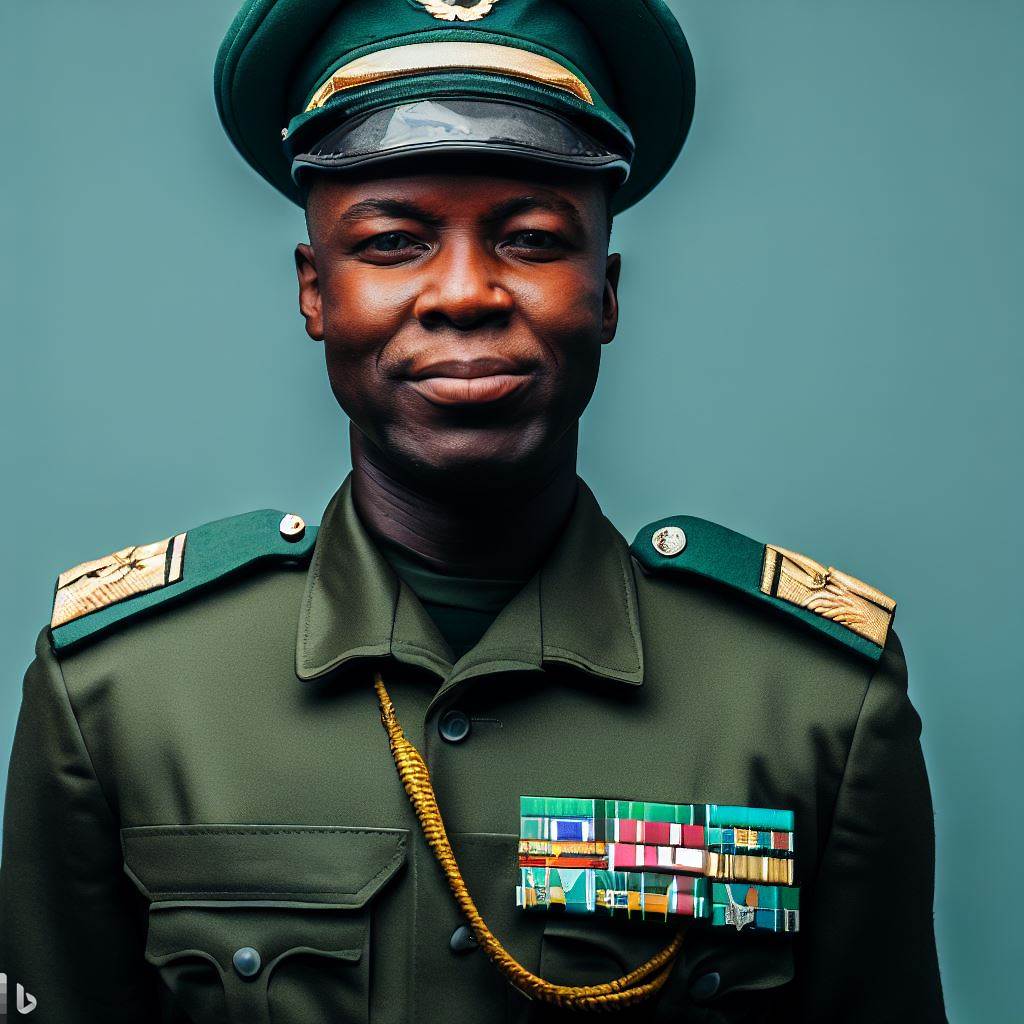Introduction
Nigeria is a country known for its rich cultural history, strong economy, and diverse population. However, one of the most significant aspects of Nigeria’s society is its military.
The Nigerian Military is a vital institution that has played a crucial role in the country’s history, dating back to colonial times.
One of the most prestigious career paths in Nigeria is becoming a military officer. It is a career that offers a sense of purpose, honor, and the opportunity to serve your country. Becoming a military officer in Nigeria is not just a job but a calling.
The purpose of this blog post is to provide a step-by-step guide to becoming a military officer in Nigeria. We will take you through the essential requirements, necessary steps to take, and some tips to ensure you succeed in your quest to become a military officer.
Eligibility Criteria
Becoming a military officer in Nigeria is not just an occupation; it is a calling to serve the country and protect its citizens.
However, not everyone is qualified to join the military. There are specific requirements that one must meet to ensure that they can meet the rigorous demands of the job and serve their country with distinction. Here are the eligibility criteria for becoming a Nigerian military officer:
Citizenship Requirement
To be a Nigerian military officer, you must be a citizen of Nigeria by birth.
Age Limit
- The minimum age required to join the Nigerian military is 17 years old.
- The maximum age limit is 28 years old for non-graduates and 30 years old for graduates.
- However, there are age waivers for individuals with special skills and experiences.
Educational Qualifications
- To join the Nigerian military, you must have at least five credits in your Senior Secondary School Certificate Examination (SSCE) or West African Examination Council (WAEC) or National Examination Council (NECO).
- You must also have a degree from a recognized university or polytechnic, HND, NCE or their equivalents for officers.
Physical and Medical Requirements
- You must be mentally and physically fit to join the Nigerian military.
- There are specific minimum height requirements for each arm of service.
- You must also pass the military medical examination and be free from any communicable diseases.
Length of Service Commitment
- When you join the Nigerian military, you are required to commit to a minimum length of service.
- The length of service for officer cadets is six years.
- However, it is possible to serve longer, depending on your chosen career path.
If you meet all these criteria, you are eligible to join the Nigerian military. However, passing the eligibility criteria is only the first step. Becoming a military officer requires extensive training in various areas, including physical, mental, and emotional training.
The military is not just a job; it is a lifestyle that requires discipline, courage, and dedication.
Furthermore, becoming a military officer is not just a matter of fulfilling the requirements. You must also have a sense of purpose, a calling to serve your country and protect its people.
Without this sense of purpose, you may find it difficult to cope with the demands of the job, which can be overwhelming at times.
In essence, if you meet the eligibility criteria and have a sense of purpose to serve your country, becoming a military officer in Nigeria can be a fulfilling and rewarding experience.
You will have the opportunity to serve your country, develop your skills, and make a real difference in people’s lives.
Above all, you will become a part of a proud heritage of military service that dates back to Nigeria’s pre-independence days.
Read: Government Policy and Its Impact on the Nigerian Military
Selection Process
Joining the Nigerian military as an officer doesn’t happen overnight. It requires dedication, commitment, and a rigorous selection process.
Here’s a step-by-step guide on how to apply for a commission in the Nigerian military
How to apply for a commission
- Visit the Nigerian Defence Academy (NDA) official website to download an application form.
- Fill out the form correctly and attach all the required documents.
- Submit the form online or by post to the designated address.
- Check the website for updates on your application status.
- Wait for an invitation letter if your application is successful.
Entrance exams and assessments
After the application process, the next step is to pass the entrance exams and assessments, which include:
- The NDA entrance examination: This exam determines if you qualify for the next stage of the selection process. The test measures your mental and intellectual capabilities in math, English, and general knowledge.
- Physical fitness test: The physical fitness test is a series of exercises that evaluate your stamina, strength, and body fitness.
- Psychological test: This test assesses your personality, emotional stability, and psychological well-being. The test helps to determine if you have the mental strength to handle the demands and pressures of your role.
Board interviews
If you pass the entrance exams and assessments, you’ll be invited for a board interview, which consists of a panel of military officers.
The board interview is to evaluate your character, leadership qualities, and commitment to serve. During the interview, you’ll be asked various questions about your background, education, motivation, and perception of the Nigerian military.
It is essential to be confident, honest, and articulate during the interview.
Medical screening
Medical fitness is a critical requirement for a successful application. You’ll undergo a rigorous medical screening that verifies your physical and mental wellbeing.
The screening checks for any medical conditions or disabilities that might hinder your ability to perform your duties effectively. If you’re cleared by the medical team, you’ll proceed to the next stage of the selection process.
Security clearance
Security clearance is the final stage of the selection process. The military conducts an extensive background check to verify your identity, background, and personal history.
The check includes fingerprinting, criminal history, credit checks, and interviews with family, friends, and colleagues.
The aim of security clearance is to ensure that you pose no security risk to the Nigerian military and the country at large.
If you pass the security clearance, you’re ready to receive your commission and become a military officer.
In summary, the Nigerian military selection process is a rigorous but rewarding journey. It requires dedication, discipline, and a passion to serve your country.
By following these steps, you can increase your chances of becoming a military officer and serving your country with honor and dignity.
Transform Your Career in Nigeria
Discover unmatched expertise with our personalized Career Consulting service. Navigate Nigeria’s job market with a strategy tailored just for you.
Get StartedRead: Nigeria’s Military: Service Branches Explained
Training
Becoming a military officer in Nigeria requires a lot of dedication, commitment and, most importantly, training. There are several training stages involved in becoming a military officer, some of which are:
Basic training
- Basic training is the first stage in becoming a military officer, and it usually lasts for six months.
- It involves physical fitness training, weapons handling, map reading, first aid training, and military etiquette.
- Basic training is designed to weed out the weak and prepare the candidates for more advanced training.
Officer cadet training
- Once a candidate completes basic training, they proceed to officer cadet training.
- This stage lasts for 12 months, and its primary objective is to train candidates to become leaders and officers.
- Training in this phase includes leadership training, academic training, field training exercises, and military laws and ethics.
Advanced training
- Advanced training is offered to officers who have completed officer cadet training and are looking to advance their careers.
- The training focuses on advanced leadership, combat tactics, and operational planning.
- It is done in specialized schools such as the Command and Staff College or specialized courses such as Intelligence Training.
Field exercises and deployments
- Field exercises and deployments are an integral part of training for military officers in Nigeria.
- These exercises and deployments provide hands-on experience in combat situations and help officers to develop their tactical skills.
- This stage also helps build teamwork, camaraderie, and esprit de corps among officers.
Continued education and promotion opportunities
- Educational advancement is critical for military officers looking to climb the ranks.
- Officers are encouraged to enroll in postgraduate courses to boost their educational qualifications.
- Promotion opportunities are also available for officers who demonstrate exemplary leadership abilities and who have the qualifications required for advancement.
Becoming a military officer in Nigeria requires a lot of hard work, discipline and sacrifice.
Training is an essential part of the process and involves several stages, including basic training, officer cadet training, advanced training, field exercises and deployments, and continued education and promotion opportunities.
If you are looking to become a military officer in Nigeria, you must be prepared to undergo rigorous training, both physical and mental, and dedicate yourself to the service of your country.
Read: Government and Military in Nigeria: A Symbiotic Relationship
Career Opportunities
Joining the Nigerian military provides career opportunities across different branches and a variety of roles for officers to choose from.
Understanding these opportunities will help you make informed decisions about your military career.
Different branches of the Nigerian military
- The Nigerian Army is the largest component of the military, responsible for land warfare operations.
- The Nigerian Navy handles naval operations including coastal defense, search and rescue, and enforcement of maritime laws.
- The Nigerian Air Force is responsible for air warfare and providing air support to ground troops.
Types of roles available for officers
- The combat arms branch involves direct contact with the enemy, providing infantry support, training, and coordination of battlefield missions.
- The combat support arms branch provides support to combat operations, such as engineering, logistics, and intelligence.
- The non-combat arms branch includes roles in administration, accounting, and legal services.
Advancement opportunities
The military offers opportunities for career growth and promotion based on merit and performance.
- Promotion from Second Lieutenant to Lieutenant can occur after two years of service.
- Promotion to Captain is dependent on the number of years of service and performance evaluations.
- Field promotions may occur in time of war for exceptional bravery and performance.
Potential post-military career paths
After serving in the military, there are various post-military career paths to be pursued. With the discipline and job experience gained in the military, an officer can transition to a range of careers, including:
- Private security
- Law enforcement
- Politics or public service
- Entrepreneurship
- Consultancy
In addition, Understanding the career opportunities available in the Nigerian military can guide your decision-making process.
Whether you choose a combat or non-combat role, the military provides a unique career path filled with growth and development opportunities.
Read: Retirement in the Nigerian Military: What to Expect

Challenges and Tips for Success
Becoming a military officer in Nigeria is no easy feat. It requires discipline, sacrifice, and a willingness to face challenges head-on. Here are some of the common challenges you may encounter and tips for success:
The Rigorous Nature of Military Service
- The physical demands of training can be grueling and may take a toll on your body.
- Adherence to rules and regulations is a must, and failure to comply can lead to disciplinary action.
- You will be required to perform duties that may be emotionally taxing or psychologically challenging.
- Prepare your mind and body for the intense physical and mental demands of military service. Learn to process stress and develop a resilient attitude.
Balancing Personal and Professional Life
- Military service can be all-consuming, leaving little time for personal pursuits.
- The frequent relocation that comes with military life can disrupt your family life and social relationships.
- TIP: Make conscious efforts to balance your personal and professional life. Prioritize self-care, maintain communication with loved ones, and create a support system.
Strategies for Excelling in Training
- Military training is designed to push you to your limits and test your abilities.
- You may face physical, mental, or emotional challenges during training that can affect your performance.
- TIP: Stay focused on your goals, seek guidance from instructors or senior officers, and persevere through setbacks. Do not hesitate to ask for help if needed, and learn from constructive criticism.
Cultivating Important Qualities such as Leadership, Adaptability, and Self-Discipline
- To be a successful military officer, you must possess certain qualities that are essential to the job.
- Leadership, adaptability, and self-discipline are some of the key traits that recruiters look for.
- Seek opportunities to develop these qualities through self-reflection, training programs, and mentorship. Practice effective communication, problem-solving, and decision-making skills to enhance your leadership abilities. Learn to adapt to changing situations and remain flexible. Cultivate self-discipline by setting achievable goals and sticking to them.
Becoming a military officer in Nigeria is a noble and rewarding career path, but it comes with its fair share of challenges.
By preparing yourself mentally and physically, finding a balance between personal and professional life, persevering through training, and cultivating important qualities, you can overcome these challenges and succeed in your endeavors.
Learn More: Women in Nigeria’s Military: Breaking Barriers
Conclusion
- Recap of eligibility criteria, selection process, training, and career opportunities
- Reiteration of the importance of becoming a military officer in Nigeria
- Final tips for aspiring candidates
After going through this step-by-step guide, you should have a clearer idea of what it takes to become a military officer in Nigeria.
Let’s recap the eligibility criteria, selection process, training, and career opportunities.
Eligibility Criteria
As a Nigerian citizen, you must be between the ages of 18 and 22 to apply for the Nigerian Defence Academy or between the ages of 24 and 29 to apply for Direct Short Service Commission or Short Service Combatant Commission.
You must also have a minimum of five credits in your O’Level examination, including Mathematics and English Language, and be of good health and character.
Selection Process
The selection process is rigorous and competitive. It includes a rigorous screening exercise, an aptitude test, a physical fitness test, and a medical examination.
Successful candidates will then proceed to the Nigerian Defence Academy or Officer Cadet Training School for officer training.
Training
Officer training is a challenging but rewarding experience. It includes both military and academic training and aims to develop leadership and management skills, physical and mental toughness, and professional competence.
Career Opportunities
As a military officer in Nigeria, you will have a wide range of career opportunities. You can serve in the army, navy, air force or any other military organization.
You can also pursue civilian careers after your military service, such as politics, entrepreneurship, or corporate leadership.
So why is it important to become a military officer in Nigeria? As a military officer, you will have the opportunity to serve your country and protect your fellow citizens.
You will also have the chance to develop your leadership skills and contribute to national security and stability.
Finally, here are some tips for aspiring candidates:
- Start preparing early: Begin your preparations as early as possible to increase your chances of success.
- Maintain a healthy lifestyle: Physical fitness and good health are essential for military service.
- Develop leadership skills: Join clubs, organizations, or teams to develop your leadership skills.
- Stay informed: Keep up to date with current affairs and military developments in Nigeria and globally.
- Be determined: The selection process is tough, but don’t give up. Keep pushing yourself and stay focused on your goal.
We hope this guide has been helpful in providing you with the information you need to become a military officer in Nigeria. Remember, the road is tough, but the rewards are worth it. Good luck!





Details all clear.
Thank you!